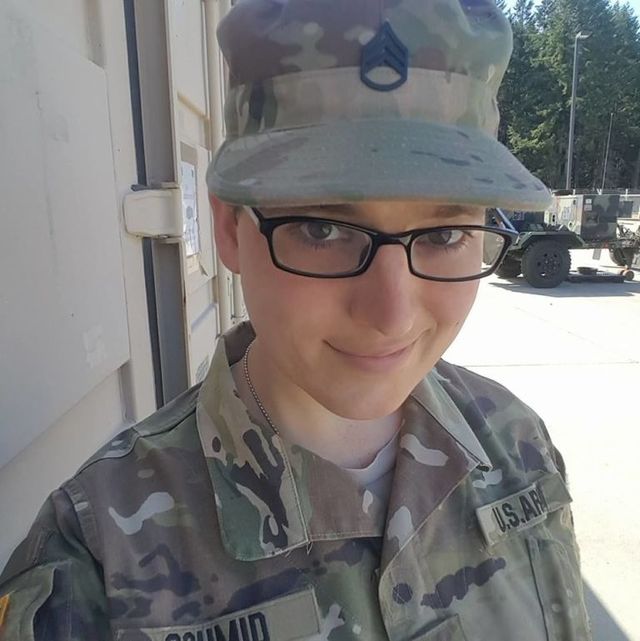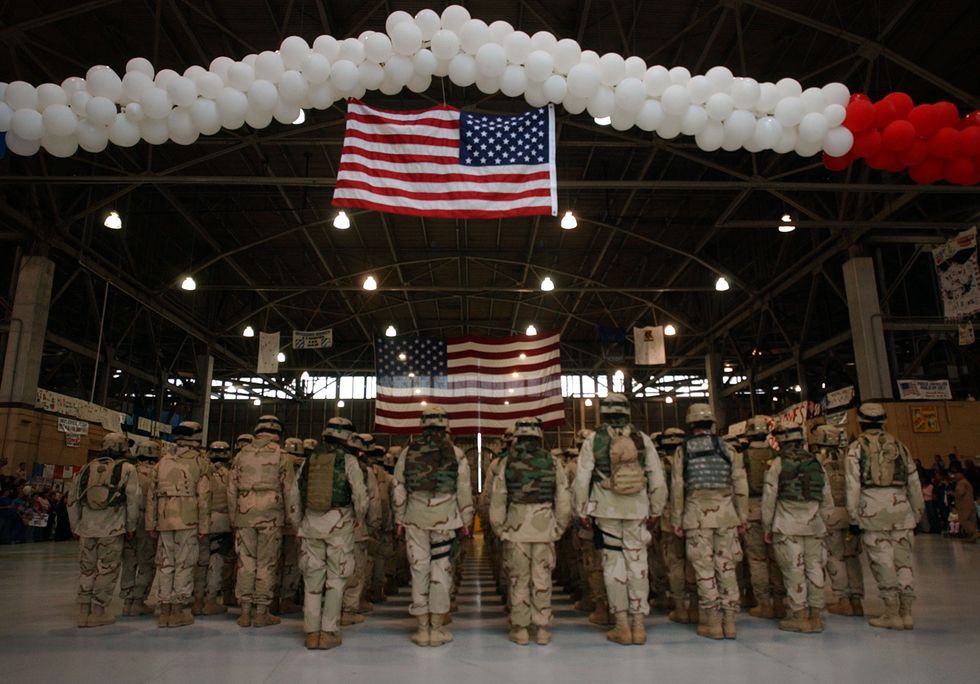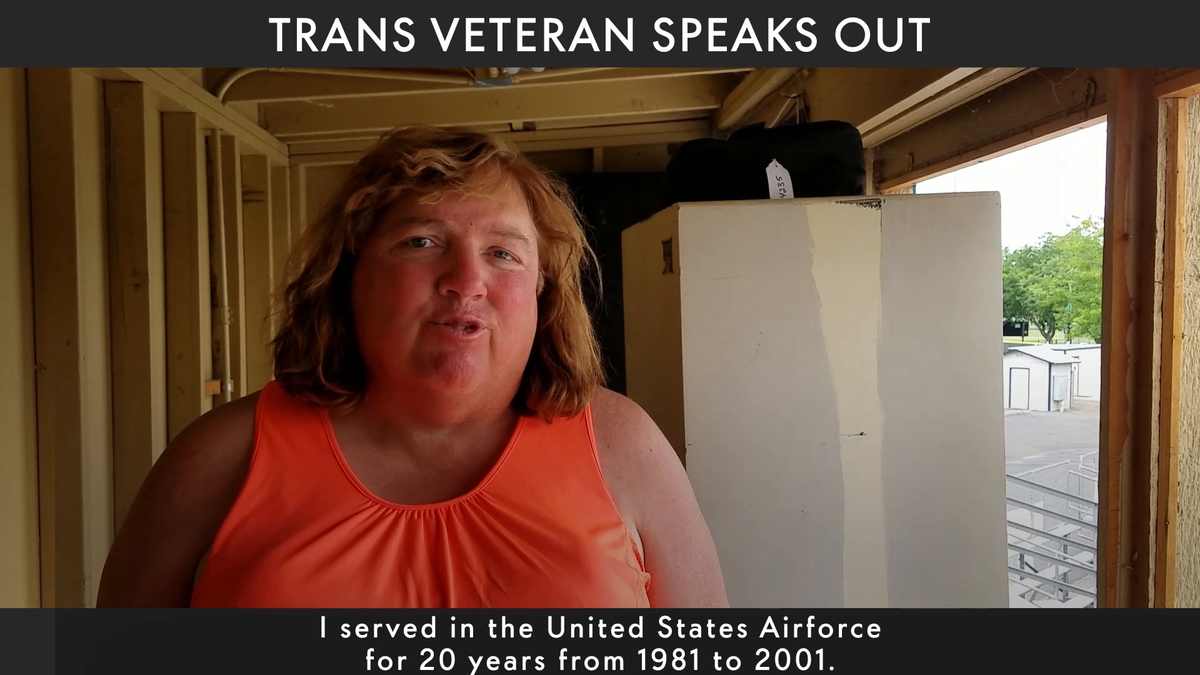At 6:15 A.M. PT on Wednesday, U.S. Army Staff Sergeant Cathrine Schmid received a Google Alert as she was doing her morning checks at the Joint Base Lewis-McChord outside of Tacoma, Washington.
She glanced at her phone and saw a series of tweets from her commander in chief, President Donald Trump. "The United States government will not accept or allow transgender individuals to serve in any capacity in the U.S. military," read a portion of the statement.
"One of the first things the military teaches you is how to deal with uncertainty," Schmid, an openly transgender female service member who has been serving for more than 12 years, tells ELLE.com. Stressing throughout the interview that she is not speaking on behalf of the Army, the 33-year-old adds: "They imbue you with this resiliency, and so that was my initial response, to fall back on that, to fall back on my training, to fall back on the resiliency the Army has given me to go ahead and finish what I needed to do."
She said she sees courage as something that you have through fear, not in the absence of it. "It's what the Army's given me, it's what makes me a soldier. Ultimately, I'm not a transgender person who happens to be a soldier. I'm a soldier who happens to be transgender. I'm a soldier first. And I will always be a soldier first—until the day they tell me I no longer am a soldier."
Trump's announcement that he plans to ban all transgender troops from serving in the military would affect thousands of individuals who have dedicated their lives to protecting their country. While exact numbers of transgender service members are hard to come by, estimates range from 2,150 to 15,500 in active duty and in the reserves, depending on the studies analyzing the numbers.
While Trump's tweeted reasoning behind the ban is that the military "cannot be burdened with the tremendous medical costs and disruption that transgender [people] will entail," a 2016 Rand Corp. study commissioned by the Department of Defense said transgender service members would have "little to no impact on unit cohesion, operational effectiveness, or readiness." The study estimated that gender-transition-related health care coverage would cause only a .04 to .13 percent increase in expenditures for active members.
Amid reports that Trump's tweets took the Pentagon by surprise, the future of active transgender troops remains unclear. White House Press Secretary Sarah Huckabee Sanders said, "The Department of Defense and the White House will have to work together as implementation takes place and is done so lawfully." On Thursday, Gen. Joseph Dunford, the chairman of the Joint Chiefs of Staff, said the current policy on who is allowed to serve will remain in effect for now.
As Schmid waits to see whether she will be permitted to continue her service, she reflects on why she enlisted in the first place. "I thought the army would make a man out of me," she says, matter-of-factly. She said she didn't feel like she was as masculine as she should be and she'd recently been laid off from a job, so she decided to enlist. It was, for Schmid, one of a series of obligations she tried to fulfill in an effort to "feel the way I thought men are supposed to feel, because I never knew what that actually was." The efforts included being a devout Evangelical Christian, joining the Army, and being a good husband. Schmid married her high school sweetheart around the same time she enlisted.
"I figured out pretty quickly that I was good at soldiering," she says. She has trained and served in Missouri, Arizona, Germany, Kansas, Texas, South Korea, Florida, Iraq, and Washington.
While she was stationed in Germany in 2008, Schmid checked herself into a hospital after she started thinking about committing suicide. She told military doctors she felt like she shouldn't be male. "They told me, basically, 'If you go forward with this your career is over,'" Schmid recalls. "I said, 'Okay, never mind, then disregard what I just said.'"
In 2013, Schmid was deployed to Iraq. "You have a lot of time to sit and think. There are not very many distractions when you are over there. It was during that time that I was finally able to admit to myself that this is what's going on." She returned home that Christmas to Florida, where she was living with her wife and two daughters.
A few weeks later, Schmid came out to her wife as transgender. The couple separated and started divorce proceedings. Once the school year was over, Schmid's wife moved back to Portland, Oregon, with their children and their divorce was finalized in September 2014.
[facebook ]https://www.facebook.com/photo.php?fbid=1986897871593853&set=pb.100008209783721.-2207520000.1501157691.&type=3&theater[/facebook]
In March 2014, Schmid considered committing suicide once again. "I ended up standing on the edge of the Tampa Bay Bridge intending to jump into the water. I decided after standing there that my kids would be better off with an alive transgender parent than a dead father."
She called a crisis line for military personnel and was hospitalized for a month in the inpatient ward. A civilian doctor spoke with Schmid about the possibility of transitioning. She said this is when she finally accepted that "there was no other way to get rid of this dysphoria."
In May, she wrote up an official memo about being transgender and submitted it in a meeting with her civilian doctor, her military doctor, her supervisor, her commanding officer, and other members of the military. Before the meeting she contacted SPARTA, a transgender military service advocacy group, which helped Schmid with her letter while also informing her that she would likely be kicked out of the military for coming out.
Schmid told her commanding officer she would "not take any steps to transition" until the Department of Defense allowed her to, and her commander decided to allow her to continue to serve.
The next month, when her children and soon-to-be-ex-wife left the state, Schmid began living full-time as a female whenever she was off-duty. "It felt like taking off a mask," she says. "I would come home after work every day and change clothes and put on makeup, even though I was getting home. And I would be me."
Meanwhile, at the MacDill Air Force Base in Florida, Schmid remembers feeling "heavily scrutinized," more so than other people. She says, "It was clear to me at the time they would find other reasons to kick me out if they were there, so I had to be perfect."
She made sure to clip her fingernails every day for the daily checks on their length. She made certain her boot laces were tucked in, and that her hair remained very short on the sides. Schmid continued to avoid using the restrooms as much as possible, since she was restricted to male restrooms, either "holding it in" or going to single-occupancy bathrooms.
In September 2014, Schmid started hormone replacement therapy. When the military said it would not cover the cost of an endocrinologist for her, she pushed and received approval to pay out of pocket for the medical care. She was allowed to fill her prescription at the base. In June 2015, she legally changed her name, which she said was a "significant point of contention" with her fellow service members. Throughout all of this, she was still officially male in the eyes of the military and had to follow the physical standards for a male during her physical training tests. She remembers getting stress fractures in both her wrists from doing at least 300 push-ups a day to maintain her physical strength, even a year after she had started hormone therapy.
[facebook ]https://www.facebook.com/photo.php?fbid=1974867366130237&set=pb.100008209783721.-2207520000.1501157691.&type=3&theater[/facebook]
Toward the end of the year her commanding officer pulled her into a meeting with her immediate supervisor and expressed his concern about how Schmid was handling having to adhere to male standards while considering herself female.
"That's part of what being a soldier is—sacrificing the way you would like to be, your rights to personal expression and everything. You sacrifice that for performing your duty. Is this the way I would like to express myself? No. But when I'm putting on the uniform, I'm putting on the uniform."
Her response seemed to satisfy the commander. In March 2016, Schmid was transferred to Washington. Before she was introduced to her unit, her new commanding officer said it would be "far less disruptive" for Schmid to arrive and be treated as a female, than to be introduced as male and switch to female when the Obama-era policy on transgender people was implemented.
Schmid found Washington to be a "much friendlier environment" than Florida, especially since she learned of more military colleagues coming out as transgender as they began to feel safe in 2016 that their careers would no longer be jeopardized. While Schmid still had to adhere to male physical standards—"It was breaking me," she remembers—she could start to grow out her hair and her fellow service members referred to her with female pronouns. Schmid said she remained open about being transgender: "I have a transgender flag bumper sticker on my car that I park in the front of my unit every day right above my U.S. Army bumper sticker, next to my gay flag bumper sticker."
"I was finally able to change my gender marker and fully be recognized as female by the Army in October of 2016," Schmid says proudly.
She says she sees her children "fairly regularly" now that she lives closer to Portland. She is married to a transgender woman named Luzia, whom she met at a transgender support group in Florida. Schmid also holds a leadership role in SPARTA, the transgender military advocacy group that helped her back in 2014. In May, she reenlisted for indefinite service. "So I'm in until they kick me out," she says.
"I love being in the Army, and my record shows that I'm good at it," Schmid says with evident passion. "I would hate to see the military divided or have it lose a significant amount of qualified soldiers. I deeply care about the mission."
For now, "I continue doing my job," she says. "Working out every morning and putting on my uniform and accomplishing a mission, because that's what soldiers do."
Schmid says she wants to be a role model for those looking for inspiration in the face of adversity, and hopes the transgender military community keeps fighting to serve.
"If I were to speak to my fellow trans service members, I would say: There are people who think we don't belong. There are people who think that we are not fit for military service, that we are not up to the task; that we are not going to meet the rigors of military service, and it is rigorous. Right now our biggest responsibility is not proving them right. If they think we don't belong and we turn around and give up, then we are proving that we don't belong. So my advice to any of my fellow transgender service members would be: Don't give up, do your duty, fulfill your responsibilities to the absolute best you can, and continue doing so until the day they tell us to stop."















